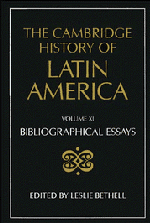Book contents
- Frontmatter
- I THE INDIGENOUS PEOPLES OF MIDDLE AND SOUTH AMERICA ON THE EVE OF THE CONQUEST
- II COLONIAL SPANISH AMERICA
- III COLONIAL BRAZIL
- IV THE INDEPENDENCE OF LATIN AMERICA
- V LATIN AMERICA: ECONOMY, SOCIETY, POLITICS, c. 1820 TO c. 1870
- VI LATIN AMERICA: ECONOMY, SOCIETY, POLITICS, c. 1870 to 1930
- VII LATIN AMERICA: ECONOMY, SOCIETY, POLITICS, 1930 to c. 1990
- VIII IDEAS IN LATIN AMERICA SINCE INDEPENDENCE
- 1 Political and social ideas, 1830–1930
- 2 The multiverse of Latin American identity, c. 1920–c. 1970
- 3 Economic ideas and ideologies since 1930
- 4 Science in twentieth-century Latin America
- IX LATIN AMERICAN CULTURE SINCE INDEPENDENCE
- X THE INTERNATIONAL RELATIONS OF LATIN AMERICA SINCE INDEPENDENCE
- THE CAMBRIDGE HISTORY OF LATIN AMERICA
1 - Political and social ideas, 1830–1930
from VIII - IDEAS IN LATIN AMERICA SINCE INDEPENDENCE
Published online by Cambridge University Press: 28 March 2008
- Frontmatter
- I THE INDIGENOUS PEOPLES OF MIDDLE AND SOUTH AMERICA ON THE EVE OF THE CONQUEST
- II COLONIAL SPANISH AMERICA
- III COLONIAL BRAZIL
- IV THE INDEPENDENCE OF LATIN AMERICA
- V LATIN AMERICA: ECONOMY, SOCIETY, POLITICS, c. 1820 TO c. 1870
- VI LATIN AMERICA: ECONOMY, SOCIETY, POLITICS, c. 1870 to 1930
- VII LATIN AMERICA: ECONOMY, SOCIETY, POLITICS, 1930 to c. 1990
- VIII IDEAS IN LATIN AMERICA SINCE INDEPENDENCE
- 1 Political and social ideas, 1830–1930
- 2 The multiverse of Latin American identity, c. 1920–c. 1970
- 3 Economic ideas and ideologies since 1930
- 4 Science in twentieth-century Latin America
- IX LATIN AMERICAN CULTURE SINCE INDEPENDENCE
- X THE INTERNATIONAL RELATIONS OF LATIN AMERICA SINCE INDEPENDENCE
- THE CAMBRIDGE HISTORY OF LATIN AMERICA
Summary
The principal sources for the study of political and social ideas in Latin America in the century after independence are the writings of the pensadores, those Latin American intellectual leaders who were in part men of letters, in part journalists, in part social or political theorists, and most often also politicians or bureaucrats. They were rarely professional academic scholars, in the present-day sense, and they lacked the leisure, the library resources and the training to engage in extensive empirical research. Thus, the pensadores were not isolated thinkers; they were usually respected and influential public figures. Though spokesmen for the establishment received most attention in the chapter by Frank Safford, ‘Politics, ideology and society in postindependence Spanish America,’ in CHLA III and in the chapter by Charles Hale, ‘Political and social ideas in Latin America, 1870–1930,’ in CHLA IV, dissenters, both inside and outside the governing group, were also treated. Moreover, since Latin American thought cannot be considered in isolation from Europe, frequent reference was made to European intellectual and political currents. Limitations of space dictate that only the secondary literature on Latin America be discussed in this essay. See also, for the period c. 1820 to c. 1870, essay V:2.
Three principal bibliographical problems were encountered in preparing this essay. The first is the paucity of general, and particularly comparative, studies which go beyond national boundaries and/or which treat the years 1830 to 1930 as a whole. Especially scarce are studies that compare ideas in Spanish America and Brazil. The second problem is the lack of biobibliographical studies, even on major figures.
- Type
- Chapter
- Information
- The Cambridge History of Latin America , pp. 863 - 869Publisher: Cambridge University PressPrint publication year: 1995



